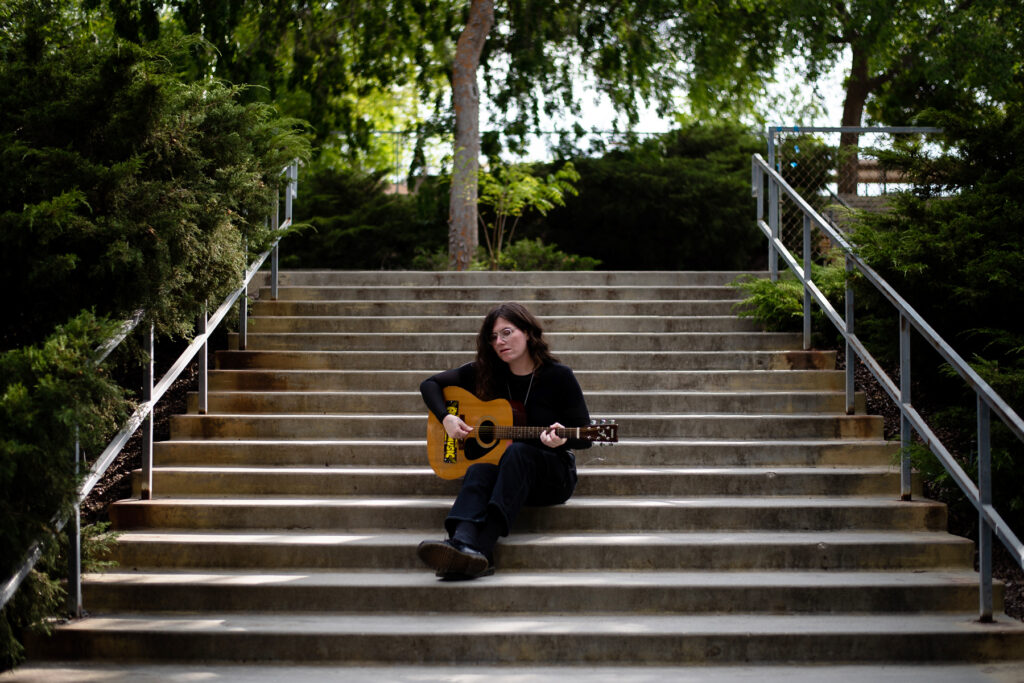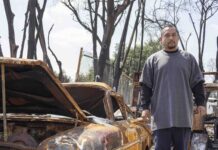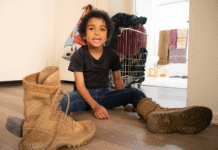Queer families take many forms
Cameron Brenner’s earliest memories of middle school hallways are not of the laughter of friends nor the excitement he could have felt. They are of whispers and pointed stares. Instead of finding peers and friendship, he found himself being called slurs.
Gym class was a nightmare. Out in the open, with dozens of peers surrounding him, the verbal assaults would escalate. He’d been called “girl” or “her” so many times that his heart was pounding before he even stepped outside of the locker room.
One afternoon, the hateful name-calling escalated to a physical attack. A boy, who had taunted him during his school years, pinned Brenner against the cold metal lockers, groping Brenner’s chest in front of the other boys.
“I was sexually harassed and assaulted by other boys for my effeminate look. In a locker room, I was groped, even, for looking like a girl,” Brenner said. “I didn’t feel like coming out as queer at that time because it was just not a good space being effeminate. I was being called ‘it,’ ‘he,’ ‘she,’ ‘hermaphrodite’… it was just not going to help that situation.”
In a culture where homosexuality was used as an insult, Brenner’s coming of age was met with harshness from others at his high school. The idea of coming out safely seemed like an impossible goal.
Brenner is one of the many LGBTQ+ individuals in the United States who have overcome relentless adversity through support from both biological and chosen families.
A recent study from The Trevor Project indicates that “three in four LGBTQ+ youth who were out reported having at least one family member who supports their sexual orientation.”
Despite those painful years of bullying, Brenner found support in both his family and chosen family — the ones who provided refuge when the world around him was unkind.
His relationship with his parents, particularly his mother, was crucial in his journey toward self-acceptance.
“My mother was a very important part of my life of acceptance,” Brenner said. “When I got married, she was there for me. She didn’t turn away. She supported me.”
Even his father, who had once been distant and physically aggressive, eventually apologized for his past actions. The reconciliation between Brenner and his father had marked a turning point in Brenner’s life when familial love became a powerful force for healing.
“My father wasn’t anti-gay, but we had a very physically aggressive relationship. He has since apologized and made amends for his past behavior,” Brenner said. “That was something I needed to heal from, and it’s been a process. But ultimately, I felt like I had a family that could accept me for who I was.”
Brenner often says that his life has been shaped by two families: the one he was born into, and the one he built.
“There is biological family, and found family,” he said. “But found family is so important because you can be easily thrown out of your family for not meeting their traditional values.”
After having endured years of violence, harassment and alienation, it was the chosen family who taught Brenner what acceptance could look like.
Cara McGee, his best friend since undergrad, helped him navigate his identity. Brenner and McGee stood up for each other in their lowest moments, and those were the moments that truly shaped the bond they shared.
“When your family defends you, when your family supports you and holds you up, I think those are really big moments,” he said.
Jacob Brenner, Cameron Brenner’s brother, echoed that sentiment. He believed that the hard times are the ones that shape bonds.
“Family’s really the people that you’re going to keep around you, the friends that have your back and you have theirs,” he said.
When it came to the people who had Cameron Brenner’s back, his mother, Bootsie Brenner, was always front and center.
“My best title?” she said. “Cameron’s mom.”
When he came out, there wasn’t any drama or disaster. It was just another aspect of her son that she welcomed with open arms.
“She supported me,” Cameron Brenner said. “She didn’t, like, turn away, you know, she supported me.”
Even Cameron Brenner’s brother had to mentally adjust from “my brother’s girlfriend” to “my brother’s husband,” but he did so without hesitation.
“Admittedly, there was this experience I had when he came out to me that was the moment of my brain’s kind of restructuring,’” the brother said. “It was all those thoughts and ideas of ‘Oh, okay, someday, I’ll meet my brother’s wife. Nope, nope, change that to husband.’”
As a political science professor at Pierce College, Cameron Brenner now mentors LGBTQ+ students who, like him, are trying to survive a world that can question their right to exist. His journey has not only been about overcoming his personal hardships, but also creating safe spaces for those who currently face similar challenges.
“Here at Pierce, I found support systems. Here’s your alumni, there’s services, there’s community,” he said. “I think Pierce College and other community colleges have provided a support system to be able to talk to.”
To this day, Cameron Brenner’s family mirrors the closeness he had with his family in the past. He maintains strong connections with his mother in particular.
“I just love the fact that at this age, it’s still an open relationship where we can communicate,” Bootsie Brenner said. “Sometimes, he tells me a little more than I want to know. I just don’t think we’re any different than any other family. What’s really nice is that I’m just not having to mess with a bunch of crazy little girls chasing him.”
In contrast to Cameron Brenner’s experience, Valerie Levitas, a student at Pierce and the president of LAPC Music Club, said she did not grow up with the safety net of a loving biological family.
“When I first came out as trans, the first thing my mom said to me was, ‘No, you’re not,’” she said. “And eventually, they did believe that I was trans, but they resented me for it. My mom is just straight up in denial. The rest of my family just, they’re not in denial. They just judge me.”
It was during these times that Levitas’ relationship with Isabellah Margaret, one of her best friends, began to become an important part to her own social survival. In high school, Levitas confided in Margaret about her identity.
“We weren’t in the best spot of our relationship, [but] I tried, even then, to be supportive,” Margaret said. “I was happy when I heard. Making sure she’s safe and taken care of — by herself, or a partner, or friends, or family. I hoped — and I was right — that it would make her much happier.”
Levitas’ story is representative of how many LGBTQ+ individuals face rejection from their biological family, forcing them to create their own chosen family. Invitations to family gatherings are only painful reminders of Levitas’ exclusion from her family.
“My cousin graduated from college in May, and my family invited my mom, my stepdad and my mom’s cousin who all live in the Valley,” Levitas said. “The party was in San Diego. They invited everybody but me, because my presence was making a scene to them.”
These rejections led Levitas to build a chosen family. Two close friends of Levitas now stand in for the love her biological family doesn’t provide. Even though they live far away from Levitas, their virtual bond is important to her.
Today, Levitas balances moments of joy against the sadness of rejection. She understands her struggles acutely and the resilience it takes to live with them.
“I mean, life is a challenge as a trans person, right? The moments of joy are the moments that I struggle for,” Levitas said. “It’s not like I am living a happy life and that I get moments of struggle. It’s like my life is a struggle and I have moments of happiness. But that doesn’t mean that I’m unhappy. I’ve just learned to live with it.”
Levitas has faced harassment in her life because of her identity.
“I’ve had people throw shit at me from moving cars. I’ve been assaulted, I’ve had a lot of fucked up shit happen to me because of who I am,” Levitas said. “Especially when I first came out, everywhere I went, people would stare and give me dirty looks.”
Although she has many wounds from the rejection of her family, Levitas leans into love with her chosen family. Regular contact with her best friends has helped fill in the rejection she has faced.
“My support system is my chosen family, my best friends. When I need support, that’s who I turn to financially, emotionally, whatever it is, that’s who I turn to,” Levitas said.
Adding further insight into nontraditional family dynamics, Dr. Nina Francis-Levin, a National Institutes of Health-sponsored postdoctoral fellow at the University of Michigan, explained that queer family structures are as individualized as any other aspect of family life. She noted that the process of coming out can create emotional shifts within families. In many cases, time helps ease initial reactions.
“Sometimes when somebody comes out, there is an adjustment period,” she said. “I think that some people will come out and at first, maybe it’ll be shocking, upsetting, disappointing, shameful, then over time, those things fall away.”
Francis-Levin emphasized that not every story of coming out follows the same trajectory. Responses from families can vary widely, and assumptions can be harmful.
As threats, including anti-LGBTQ+ legislation, continue to loom over the community, Cameron Brenner remains steadfast. He insists on the importance of preparedness by staying informed and connected with legal and community resources.
“For me, it’s a lot of research and investigation, a lot of talking to people,” he said.
Looking into the future, he hopes for a shift in leadership which embraces progressive, queer-friendly policies.
“I’m hoping five years from now that the next presidency is one that is not going to be as right-leaning,” he said. “I’m hoping for a socially progressive, queer-friendly President who will reverse most of the damage as much of it can be done and that states like California will actively not listen or comply with the Trump administration’s particularly vile policies.”
Cameron Brenner said he would like to see a movement founded in mutual support, which would be able to oppose what he said are oppressive initiatives. Despite enduring struggles, he calls on everyone to nurture hope and work together toward a resilient future for the LGBTQ+ community.
“What I see for the next four years is resistance. We have to be resistant, we have to stand up and fight for each other,” he said. “We really gotta buckle down and prepare ourselves and support each other.”




